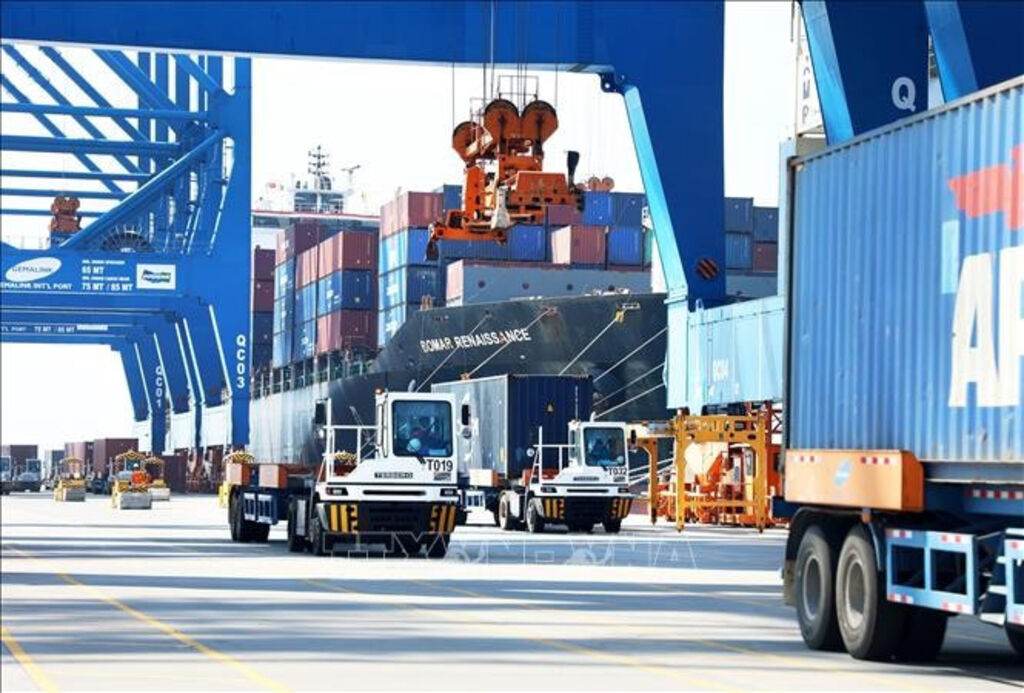 |
| Export activities at Cai Mep - Thi Vai port cluster, Phu My town, Ba Ria - Vung Tau province__Photo: VNA |
The recent consensus between the negotiating delegations of Vietnam and the US on a joint statement outlining a framework for a fair and balanced reciprocal trade agreement has been welcomed by experts as a positive outcome, stemming from proactive preparation and early policy foresight by the Vietnamese Government and relevant ministries.
Dr Le Quang Minh, a lecturer at the University of Economics – Vietnam National University, Hanoi, said the Southeast Asian nation began preparing for evolving US trade policies as early as the inauguration of President Donald Trump, anticipating potential shifts and developing appropriate response strategies.
Vietnam was among the earliest countries to engage in trade negotiations with the US, he said. The process was well-prepared, with considerable input from major US-invested FDI firms. These enterprises also supported the Government at large-scaled forums in responding to US tariff measures, Minh noted.
Pham Luu Hung, Chief Economist and Director of SSI Research at SSI Securities Corporation, described the outcome as highly encouraging, positioning Vietnam as the third large trading partner of the US to reach a preliminary agreement on tariffs – a stepping stone for elevating its stature in international trade.
Assoc. Prof. Dr Nguyen Thuong Lang, a senior economist at the School of Trade and International Economics of the National Economics University, hailed the negotiations between the Vietnamese leader and President Trump as a significant success, resulting in a mutually beneficial agreement and signaling new momentum in bilateral relations. He added that Vietnam has demonstrated its capacity to create tangible investment benefits for US partners.
To fully capitalise on preferential tariffs, he added, Vietnam should promote domestic production of materials, components, and parts to increase localization rates and meet criteria for the lowest tariff levels. This, in turn, will help local enterprises become more deeply integrated into global supply chains.
Lang suggested the two countries consider elevating trade ties to a bilateral or regional free trade agreement to open up new opportunities and reduce trade barriers.
Meanwhile, Minh also stressed the importance of strictly complying with the rules of origin, noting the need to prevent origin fraud or the misuse of the "Made in Vietnam" label for trade advantages.
Sharing this perspective, Hung added that the Vietnamese Government has introduced a broad range of supportive policies for investors potentially impacted by tariff shifts, such as facilitated land access and preferential incentives for high-tech investors, among others.
On July 2 evening (Hanoi time), General Secretary of the Communist Party of Vietnam Central Committee To Lam held phone talks with US President Donald Trump to discuss the two countries' relations and reciprocal tariff negotiations. Expressing their delight at the strong and positive development of bilateral ties, the two leaders welcomed the negotiating delegations reaching consensus on a Vietnam – US joint statement concerning a fair and balanced reciprocal trade agreement framework.
The US President highly valued Vietnam’s commitment to granting preferential market access for US goods, including large-engine automobiles. He affirmed that the US will significantly reduce reciprocal tariffs on many Vietnamese exports, and will continue to work with Vietnam to resolve outstanding trade-related issues, particularly in priority areas of both sides.
General Secretary Lam called on the US to soon recognize Vietnam as a market economy and lift export restrictions on certain high-tech products.- (VNA/VLLF)









